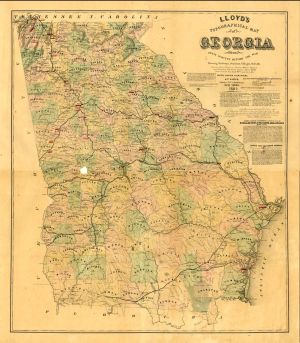 Today the Columbus Baptist Association of Georgia assembles at the Mt. Zion Baptist Church in Talbot County for the first day of a three-day meeting. The war permeates the sessions and formal discussions that take place throughout the associational meeting. Missions and Sunday Schools are suffering, delegates note, while some pulpits are no longer regularly filled.
Today the Columbus Baptist Association of Georgia assembles at the Mt. Zion Baptist Church in Talbot County for the first day of a three-day meeting. The war permeates the sessions and formal discussions that take place throughout the associational meeting. Missions and Sunday Schools are suffering, delegates note, while some pulpits are no longer regularly filled.
A “Report on the State of Religion” notes the slivers of light in an otherwise dark landscape:
The committee charged with this subject report with thanksgiving to God our Savior, that according to their intelligence, the religious condition of the associational district has improved since the last session of this body. The progress of the war, it is true, has reduced the male attendance on our religious meetings, and deprived us of the services of many of the ministers of Christ accustomed to labor within the bounds of the Association: but the committee hope that we have been blessed with a partial abatement of the worldly temper that so deeply agitated us in the first stages of the conflict of arms, and with a deeper sense of our dependence on the only source of our strength. The inroads of death, the scenes of the hospital, thoughts of prison-houses, the temporal privations we endure, the magnitude of pending issues, the experimental and perilous nature of our future as a people, have had the effect of humbling somewhat the pride of our hearts, drawing forth our sympathies, and bringing us to a more constant and earnest suit to the mercy of the Savior. Prayer has become more prevalent, the poor have been more thought of, and in the midst of a long and dreary spiritual drought, the Lord has in places among us graciously turned the hearts of sinners to Him. Many have believed and been saved. All honor to the adorable Redeemer. The favor, too, shown by the Divine hand to our cause as a people aspiring to political independence and security, coupled with these recent demonstrations of his Holy Spirit among us, has, in a degree, strengthened our faith in his goodness to us, and emboldened us to hope more devoutly and confidingly for a continuance of his car[e] and mercy. “As many as I love I rebuke and chasten: be zealous therefore, and repent.” Rev. iii:19.
The report also addresses the lack of men in Baptist churches, and offers advice pertaining to prayer among church families:
We would venture to push the subject of family prayer a step further. In the absence or declension of her husband, (circumstances otherwise agreeing to it,) we see neither in revelation nor in reason a barrier to the maintaining of vocal prayer daily in the midst of her assembled children and servants by a sister in Christ. On the contrary, we doubt not that ample reward would attend on such a service conducted in the love and fear of God.
This gentle suggestion comes at a time when Southern Baptist women are relegated to quietness in church services (notwithstanding an earlier 18th century era when women deaconesses and preachers were not uncommon among some Baptists of the South). At the present, some Baptists of the Columbus Association apparently are hesitant to encourage women to assume any spiritual leadership even in the home. In the broader perspective, the war in the months and years ahead does empower many women to have a greater voice in spiritual matters, but ultimately does not result in Southern Baptist women escaping from a male-dominated church and regional culture.
Source: Minutes of the Thirty-Fourth Annual Session of the Columbus Baptist Association, September 28, 29, 30, 1862 (link)


